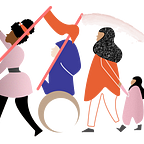Though mutual aid is by no means a new practice we’re now seeing the term resurface amid COVID-19, especially among left and progressive circles. As soon as this public health and economic crisis began to hit Minnesota, we quickly threw together the WFPC Mutual Aid Fund. It’s not like we’re your typical nonprofit anyway, but this wasn’t a concept we had seen implemented in other organizations similar to ours before. We didn’t know how else to respond when our people were suffering and struggling to afford their basic needs, but we were determined to figure it out.
Mutual aid is when a community comes together to meet its people’s immediate material needs, especially in times of financial hardship, in an inherently anti-capitalist act of harm reduction. It can look like helping someone out who needs groceries, rent money, or a prescription refill. Mutual aid networks can also be used as vehicles for political education, resource sharing, and organizing.
In the past three weeks we’ve already distributed nearly $7,000 in financial aid to over 35 young women and trans & non-binary folks most directly impacted by this pandemic, many of whom may not otherwise receive government aid. It didn’t take long for requests to start pouring in. We began hearing stories from our base of students losing on-campus jobs, young artists and organizers unable to make rent after being laid off, pregnant people and parents unable to afford groceries, and people fleeing toxic and abusive quarantine situations with nowhere to go. It’s heartbreaking reading these stories, and lots of time I find myself feeling helpless that we can’t give everyone all of the money they need immediately. But my coworkers keep me grounded and remind me of the fact that every individual person we are able to help is impactful, because we are doing our best while operating within the nonprofit industrial complex and capitalism.
We host one of the few mutual aid funds within the Twin Cities where people can receive direct cash, no questions asked, and demand is high. As each day passes we get more requests as life after COVID-19 becomes even more uncertain. While our communities are begging for scraps, the government continues to rely on foundations, nonprofits, and corporations to provide relief when they’re barely scratching the surface of what we need.
The existence of the nonprofit industrial complex depends on keeping people in poverty, and acts of charity replicate and retain these unjust power structures.
Take for example, the issue of homelessness: the government gives a significant amount of funding directly to nonprofits and catholic charities who run shelters. We have an abundance of vacant units to house everyone experiencing homelessness (both during a pandemic and all the time), yet we don’t. Why? It’s not because we lack resources, it’s because those organizations would then become obsolete. The fact is that many nonprofits operate as corporations, and the government often fails to provide comprehensive relief.
Now that we’re in a time of crisis, there’s an unprecedented amount of “emergency funding” opportunities opening up from foundations and funders. Lots of it is even unrestricted, which is rare. For a second it kind of feels like we’re in nonprofit Candy Land. Of course we’re trying to take advantage of these opportunities as an organization (we still gotta to keep our staff on payroll), but the next thing you know we’re bogged down in grant applications, budgets, and strategic plans, in the abyss that so many other EDs fall into. How many more people could we help in this time of crisis if the majority of our staff time wasn’t spent grant writing, if foundations actually pitched in their fair share?
The private sector (yes, including nonprofits) are being praised for all of the good they’re doing to help out during this crisis, like donating a small percentage of their proceeds to direct aid.
Here’s the thing: that’s 0.025% of their endowment.
By me donating $5 to the WFPC Mutual Aid Fund I’m literally giving away more of my personal wealth to disaster relief than these foundations are.
Ultimately while we advocate for widespread systematic, socio-economic and political reform, we recognize that many of our people are in immediate need now. Please consider making a contribution to the WFPC Mutual Aid Fund here.
We know that for as long as we’re living under these systems, neither the government nor private sector will save us. We must continue to lean into mutual aid efforts for both our collective survival and liberation, especially in times of crisis. We ask you to participate in solidarity, not charity with us.
Sonia Neculescu is the Political Action Director at Women for Political Change (WFPC) — a multiracial, youth-led organization that holistically invests in the leadership and political power of young women and trans & non-binary folks in Minnesota.
